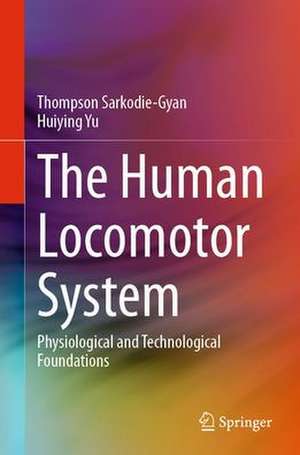The Human Locomotor System: Physiological and Technological Foundations
Autor Thompson Sarkodie-Gyan, Huiying Yuen Limba Engleză Hardback – 28 iun 2023
The textbook describes the complexity of the human dynamic behavior in space and its ability to produce coordinated, adaptive, dynamically stable movements under steady conditions while negotiating complex terrains and experiencing unexpected perturbations.
Applying fundamental theories of biomechanics and physiology, the authors further consider the physical, perceptual, and motor aspects of the locomotor system towards the analysis of how humans can behave adaptively in space by virtue of their intelligent sensory-motor functions and to illuminate our understanding of how this complexity in behavior can provide insight into the neural control of locomotion of the musculoskeletal system. The text provides a foundation for describing the normal and abnormal human locomotor systems. The Human Locomotor System: Physiological and Technological Foundations is intended as a primary text for upper-undergraduate and graduate-level courses in neuroscience, gait analysis, kinesiology, physical therapy, sports science, and biomedical and rehabilitation engineering. It is also a valuable professional reference for scientists and engineers at medical and pharmaceutical companies involved in bioengineering research and development.
Preț: 1103.51 lei
Preț vechi: 1161.58 lei
-5% Nou
Puncte Express: 1655
Preț estimativ în valută:
211.15€ • 221.06$ • 174.72£
211.15€ • 221.06$ • 174.72£
Carte tipărită la comandă
Livrare economică 07-21 aprilie
Preluare comenzi: 021 569.72.76
Specificații
ISBN-13: 9783031327803
ISBN-10: 3031327802
Pagini: 299
Ilustrații: XVII, 299 p. 147 illus., 106 illus. in color.
Dimensiuni: 155 x 235 mm
Greutate: 0.65 kg
Ediția:2023
Editura: Springer International Publishing
Colecția Springer
Locul publicării:Cham, Switzerland
ISBN-10: 3031327802
Pagini: 299
Ilustrații: XVII, 299 p. 147 illus., 106 illus. in color.
Dimensiuni: 155 x 235 mm
Greutate: 0.65 kg
Ediția:2023
Editura: Springer International Publishing
Colecția Springer
Locul publicării:Cham, Switzerland
Cuprins
Chapter 1. Introduction to the Human Locomotor System.- Chapter 2. Significance in the Understanding of the Human Locomotor System.- Chapter 3. Challenges and Concerns to Society.- Chapter 4. Key Determinants in Human Locomotor System.- Chapter 5. Measurements in Human Locomotor System.- Chapter 6. Sensors/Transducers in Human Locomotor System.- Chapter 7. Technology initiatives in human locomotor systems.- Chapter 8. Artificial Intelligence in Human Locomotor System.
Notă biografică
Thompson Sarkodie-Gyan, D.Sc., is a retired tenured professor of electrical and computer engineering with the College of Engineering at the University of Texas at El Paso (UTEP). He received a Master of Engineering Sciences (Dipl. Ing) in Electrical Engineering and Cybernetics from the Technical University Otto-von-Guericke Magdeburg and the Doctor of Engineering Sciences (Dr.-Ing) in Measurement and Control Engineering from the Technical University Berlin, both in Germany. He is a member of the World Federation of Neurorehabilitation, a Fellow of the Institute of Measurement and Control (InstMC), a certified European Engineer of the FEANI (Eur Ing), and a Distinguished Member of the German Institution of Engineers, VDI. Professor Sarkodie-Gyan’s areas of specialization are in technical cybernetics and systems science, measurement and instrumentation, automatic controls, experimental physiology, applied mathematics, artificial and computational intelligence, sensors (also biosensors), and biomedical engineering (human locomotor system).
He has held academic positions in higher education institutions in Germany, the United Kingdom, South America, China, and the United States. He earned the title Reader in Cybernetics and Systems Science in the United Kingdom. He successfully supervised over twenty students for the Doctor of Philosophy (Ph.D.) degree in machine vision and pattern recognition, robotics, automatic controls, soft computing, and biomedical engineering. He has also served as an external examiner for Ph.D. candidates in the United Kingdom, France, and the United States. He is the author of the book Neurorehabilitation Devices (McGraw Hill, 2005), has published extensively in peer-reviewed journals, serves as a reviewer for the National Institutes of Health (NIH) and the National Science Foundation (NSF), and is on the editorial boards of several high-impact peer-reviewed journals. He holds patents in Germany, the UnitedKingdom, and the United States. Huiying Yu, Ph.D., is a lecturer in biological sciences and computer sciences at Dona Ana Community College at New Mexico State University, Las Cruces. She received a Bachelor of Science (B.Sc.) in biological sciences from Durham University, UK, a Master of Philosophy (M.Phil.) in Computational Biology from Cambridge University, UK, and the Doctor of Philosophy in Electrical and Computer Engineering specializing in biomedical engineering (experimental design and analysis of the human musculoskeletal system) from the University of Texas at El Paso (UTEP), where she was also a postdoctoral researcher and lecturer in the Department of Industrial and Systems Engineering.
Textul de pe ultima copertă
The textbook describes the complexity of the human dynamic behavior in space and its ability to produce coordinated, adaptive, dynamically stable movements under steady conditions while negotiating complex terrains and experiencing unexpected perturbations.
Applying fundamental theories of biomechanics and physiology, the authors further consider the physical, perceptual, and motor aspects of the locomotor system towards the analysis of how humans can behave adaptively in space by virtue of their intelligent sensory-motor functions and to illuminate our understanding of how this complexity in behavior can provide insight into the neural control of locomotion of the musculoskeletal system. The text provides a foundation for describing the normal and abnormal human locomotor systems. The Human Locomotor System: Physiological and Technological Foundations is intended as a primary text for upper-undergraduate and graduate-level courses inneuroscience, gait analysis, kinesiology, physical therapy, sports science, and biomedical and rehabilitation engineering. It is also a valuable professional reference for scientists and engineers at medical and pharmaceutical companies involved in bioengineering research and development.
- Offers foundational coverage of the topic;
- Provides new insights, recent developments, and case studies;
- Covers advances in the application of sensors and transducers.
Caracteristici
Offers foundational coverage of the topic Provides new insights, recent developments, and case studies Covers advances in the application of sensors and transducers
